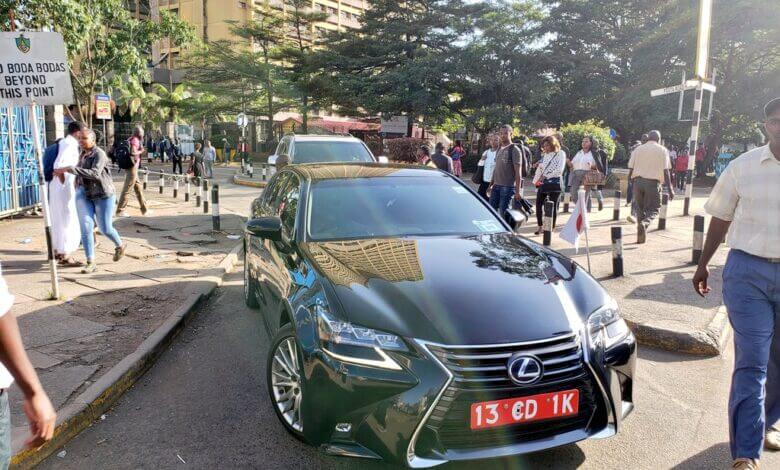In Kenya, the National Transport and Safety Authority (NTSA) oversees vehicle registration and re-registration processes, ensuring compliance with national regulations and promoting road safety. For diplomats acquiring vehicles previously registered under civilian ownership, re-registering these vehicles for diplomatic use is a critical step to align with legal requirements and access privileges such as duty exemptions and special number plates. This process, while straightforward when approached systematically, involves navigating specific documentation, NTSA’s Transport Integrated Management System (TIMS), and coordination with government bodies like the Kenya Revenue Authority (KRA) and the Ministry of Foreign Affairs.
As a leading transport news platform, NTSANews.co.ke brings you this comprehensive guide to re-registering ex-civilian vehicles to diplomatic status on the NTSA portal in 2025. Whether you’re a diplomat, embassy official, or administrative staff, this article provides a step-by-step roadmap, key requirements, and practical tips to ensure a seamless transition. With Kenya’s transport sector evolving and digital platforms like the NTSA portal streamlining processes, staying informed is essential for compliance and efficiency.
Why Re-Register Ex-Civilian Vehicles to Diplomatic Status?
Re-registering a vehicle from civilian to diplomatic ownership is not just a bureaucratic formality—it’s a legal necessity that ensures transparency, compliance, and access to diplomatic privileges. Here’s why this process matters:
- Legal Compliance: Diplomatic vehicles must be registered with special number plates (e.g., CD for Corps Diplomatique) to reflect their status and comply with Kenyan laws.
- Duty Exemptions: Diplomatic vehicles often qualify for tax exemptions, but this requires proper registration and clearance from the KRA and Ministry of Foreign Affairs.
- Transparency and Accountability: Re-registration updates ownership records in the NTSA database, preventing fraud and ensuring accurate tracking of vehicle history.
- Road Safety and Privileges: Diplomatic plates signal special status, which may influence law enforcement interactions and parking privileges, while ensuring vehicles meet safety standards.
For diplomats transitioning to Kenya or acquiring a locally owned vehicle, understanding this process is crucial to avoid delays, penalties, or legal issues.
Understanding the NTSA Portal and TIMS
The NTSA’s Transport Integrated Management System (TIMS) is the backbone of vehicle-related services in Kenya. Launched to digitize and streamline processes, TIMS allows users to handle vehicle registration, re-registration, and ownership transfers online. For diplomats, the portal is the primary platform for initiating and tracking the re-registration process.
Key Features of the NTSA Portal
- User-Friendly Interface: Accessible via www.ntsa.go.ke, TIMS allows users to log in, select services, and upload documents from anywhere.
- Real-Time Updates: Receive SMS notifications on application status, ensuring transparency.
- Secure Document Submission: Upload scanned documents in PDF format for verification, reducing paperwork errors.
- Payment Integration: Pay re-registration fees based on vehicle CC rating directly through the portal.
To begin, diplomats or their representatives must create a TIMS account, which requires a valid KRA PIN and identification details. If you don’t have an account, the NTSA website provides clear instructions for registration.
Step-by-Step Guide to Re-Registering Ex-Civilian Vehicles to Diplomatic Status
Re-registering an ex-civilian vehicle to diplomatic status involves multiple steps, coordination with government agencies, and adherence to specific requirements. Below is a detailed guide to navigate the process in 2025.
Step 1: Obtain a Diplomatic Note from the Embassy
The process begins with securing a diplomatic note from the embassy or consulate, addressed to the Ministry of Foreign Affairs. This document is critical as it verifies the diplomat’s status and the vehicle’s intended use.
- Details to Include: The note should specify the vehicle’s make, model, registration number, and the diplomat’s name and rank.
- Purpose: It serves as formal communication to initiate the re-registration process and request clearance.
Contact your embassy’s protocol office to prepare this note, ensuring it meets the Ministry’s requirements.
Step 2: Secure Clearance from the Ministry of Foreign Affairs
The Ministry of Foreign Affairs plays a pivotal role in approving the transition of a vehicle to diplomatic status. Submit the diplomatic note to the Ministry, which will review and provide clearance.
- Processing Time: Clearance typically takes 5–10 working days, depending on the Ministry’s workload.
- Outcome: A letter of approval from the Ministry, which must accompany your NTSA application.
Step 3: Apply for a Special Number Plate via KRA
Diplomatic vehicles require special number plates (e.g., CD plates) issued by the Kenya Revenue Authority (KRA). This step involves applying through the KRA’s online portal.
- Required Documents:
- Copy of the diplomatic note.
- Vehicle’s original registration certificate.
- Diplomat’s ID or passport copy.
- Application Process: Visit the KRA website, log in, and submit the application with the required documents. Pay the applicable fees, which vary based on the vehicle’s make and model.
- Outcome: KRA issues a special number plate, which is essential for the next steps.
Step 4: Vehicle Inspection by Kenya Bureau of Standards (KEBS)
Before re-registration, the vehicle must undergo a safety and environmental standards inspection by KEBS.
- Process: Schedule an inspection at a KEBS inspection center. The vehicle will be checked for roadworthiness, emissions, and compliance with Kenyan standards.
- Documents Needed: Original logbook, current registration certificate, and diplomatic note.
- Outcome: KEBS issues an inspection report, which must be submitted to NTSA.
Step 5: Obtain Comprehensive Insurance
Diplomatic vehicles require comprehensive insurance coverage, as mandated by Kenyan law. This ensures the vehicle is protected against accidents, theft, or damage.
- Choosing a Provider: Select a reputable insurance company in Kenya. Compare quotes to ensure cost-effectiveness.
- Documents Required: Vehicle details, inspection report, and diplomat’s identification.
- Submission: Provide proof of insurance during the NTSA registration process.
Step 6: Gather Required Documents for NTSA Submission
To re-register the vehicle on the NTSA portal, compile the following documents:
- Duly Filled Form A: Download from the KRA website; used for provisional registration.
- Duly Filled Form C: For ownership transfer, stamped by the seller (if applicable) and the embassy.
- Original Logbook: Proves the vehicle’s ownership history.
- Original Entry Document: Confirms the vehicle’s legal entry into Kenya.
- KRA PIN for Buyer and Seller: Ensures tax compliance.
- Copy of Diplomat’s Passport/Diplomatic ID: Verifies diplomatic status.
- Surrendered Civilian Number Plates: Include a stamped letter confirming surrender to NTSA.
- Diplomatic Note and Ministry Clearance: From Steps 1 and 2.
- KEBS Inspection Report: From Step 4.
- Proof of Insurance: From Step 5.
- Customs Duty Receipt (if applicable): For vehicles previously imported duty-free, ensure duties are cleared with KRA.
Step 7: Submit Application on the NTSA Portal
With all documents ready, log in to your TIMS account on the NTSA portal to initiate re-registration.
- Navigate to Re-registration Menu: Access the “Vehicle Registration” section and select “Apply Vehicle Re-registration.”
- Select Vehicle and Re-registration Type: Choose the vehicle and specify “Civilian to Diplomatic” as the re-registration type.
- Enter New Owner Details: Input the diplomat’s ID and KRA PIN.
- Upload Documents: Scan and attach all required documents in PDF format.
- Pay Fees: Fees vary based on the vehicle’s CC rating. Check the NTSA website for the latest rates.
- Submit Application: Review all details and submit. Keep the confirmation for your records.
Step 8: Await Approval and SMS Notification
NTSA typically processes re-registration applications within 10 working days. You’ll receive an SMS notification confirming approval or requesting additional documents.
- Tip: Regularly check your TIMS account for updates to avoid delays.
- Outcome: Upon approval, NTSA updates the vehicle’s ownership records to reflect diplomatic status.
Step 9: Obtain New Logbook and Plates
Once approved, visit an NTSA office to collect the new logbook and diplomatic number plates.
- Documents to Present: Application confirmation, proof of payment, and diplomat’s ID.
- Logbook: The new logbook reflects the vehicle’s diplomatic status and ownership details.
- Plates: Install the special number plates (e.g., CD plates) as issued by KRA.
Challenges and How to Overcome Them
While the NTSA portal has streamlined re-registration, challenges may arise. Here’s how to address common hurdles:
- Missing Documents: Double-check the checklist before submission. Contact the seller or embassy for missing items like the logbook or entry document.
- Delays in Processing: Be patient, as processing times can vary. Follow up via the NTSA portal or contact NTSA customer service.
- Inaccurate Information: Ensure all forms are filled accurately to avoid rejection. Use a licensed customs agent if dealing with duty-free vehicles.
- Complex Paperwork: Seek assistance from your embassy’s protocol office or a professional clearing agent familiar with NTSA and KRA processes.
Benefits of Re-Registering as a Diplomatic Vehicle
Re-registering an ex-civilian vehicle to diplomatic status offers several advantages:
- Tax Exemptions: Diplomats may be eligible for duty exemptions, reducing ownership costs.
- Special Privileges: Diplomatic plates provide parking and traffic privileges, enhancing convenience.
- Enhanced Security: Accurate ownership records reduce the risk of fraud or disputes.
- Compliance with International Protocols: Aligns with diplomatic agreements between Kenya and other nations.
Tips for a Smooth Re-Registration Process
To ensure a hassle-free experience, consider these practical tips:
- Start Early: Begin the process well in advance to account for potential delays, especially with Ministry clearance.
- Use a Licensed Agent: For complex cases, enlist a customs agent like Derrickson Systems Ltd to navigate KRA and NTSA requirements.
- Verify Documents: Cross-check all documents for accuracy and completeness before submission.
- Stay Updated: Monitor NTSA and KRA websites for policy updates, as requirements may change in 2025.
- Engage Your Embassy: Leverage your embassy’s protocol office for guidance and support.
The Role of NTSA in Diplomatic Vehicle Registration
The NTSA plays a critical role in ensuring smooth ownership transitions. Beyond processing applications, NTSA:
- Verifies Documentation: Ensures all documents meet legal standards.
- Updates Records: Maintains accurate ownership data for transparency and law enforcement.
- Promotes Road Safety: Ensures vehicles meet safety and environmental standards through inspections.
By leveraging the NTSA portal, diplomats can complete most steps online, reducing the need for in-person visits and enhancing efficiency.
Re-registering an ex-civilian vehicle to diplomatic status on the NTSA portal is a manageable process when approached with the right information and preparation. By securing a diplomatic note, obtaining Ministry clearance, applying for special plates, and submitting accurate documents through TIMS, diplomats can ensure compliance and enjoy the privileges of diplomatic vehicle ownership. Despite potential challenges like missing documents or processing delays, proactive planning and professional assistance can streamline the process.
At NTSANews.co.ke, we’re committed to keeping you informed about Kenya’s transport sector. Whether you’re a diplomat, embassy staff, or vehicle owner, this guide equips you with the knowledge to navigate the NTSA portal confidently in 2025. For further assistance, visit www.ntsa.go.ke or contact your embassy’s protocol office. Safe travels, and ensure your vehicle is legally registered to keep Kenya’s roads safe and compliant!





